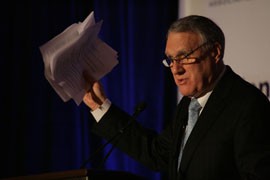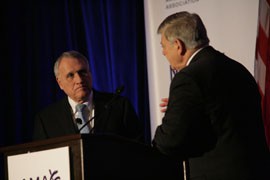Cronkite News has moved to a new home at cronkitenews.azpbs.org. Use this site to search archives from 2011 to May 2015. You can search the new site for current stories.
Kyl urges doctors to take fight against Medicare payment cuts to Congress
WASHINGTON – Sen. Jon Kyl, R-Ariz., urged doctors at an American Medical Association conference Tuesday to take their fight against looming cuts in physicians’ Medicare reimbursements to their elected officials in Congress.
Kyl, greeted Tuesday as the association’s “champion,” is on a House-Senate conference committee on the extension of the payroll tax break, which is also considering the Medicare physician reimbursement rate and an extension of unemployment benefits.
“There is a possibility that this issue will be resolved over the course of this day,” Kyl told the doctors Tuesday.
But if the conference committee does not come to some agreement by March 1, fees that Medicare pays to doctors are scheduled to be cut 27.4 percent. Critics say a reduction of that size would cause physicians to leave or lose their practices – a particular problem in Arizona where there are already fewer doctors for Medicare patients than the national average.
“One of my key goals is to make sure that there are enough physicians to take care of Medicare patients when the time comes,” Kyl said. “We’re on a path right now not to have that because we’re simply not reimbursing them with what it costs them to stay in business.”
A federal policy director at the Medicare Rights Center, a consumer service nonprofit working with Medicare beneficiaries, said there is not a current “widespread physician shortage within Medicare.” But Ilene Stein agreed that any cut to physician reimbursement would pose a threat to Medicare access.
“The fear is if a cut were to take place, that’s where we could see access issues,” she said.
The Sustainable Growth Rate (SGR), the current payment formula used to reimburse physicians under Medicare, is considered flawed by congressmen, doctors and consumer advocates alike. But the debate arises when deciding how to fix it.
“Across party lines, there’s an agreement that the SGR formula is not working and is something that needs to be solved,” Stein said. “Most of the dispute is how you go about solving it.”
Kyl on Tuesday proposed shifting money that had been set aside for military operations in Iraq and Afghanistan to cover the costs of replacing SGR. The so-called Overseas Contingency Operations fund is budgeted but less likely to be needed in coming years as those wars wind down. Kyl said taking the OCO to cover the SGR is like applying “Monopoly money, (to) wipe them both off the books.”
“It may sound a little crazy, but remember, you’re in Washington, D.C.,” he said Tuesday.
But Kyl said he doubts the conference committee will follow through with his recommendation to repeal the SGR payment formula.
“It hangs in the balance in the moment, that’s why some work by AMA could make a big difference,” Kyl said.
Every state would face hardships based on the March 1 cuts, Kyl said, but Arizona’s challenges would be “a little bit more severe.”
“We have a bigger physician shortage than most states,” he said. “To some extent we have more indigent population. We have both a younger and older population, and that presents challenges to the health care system.”
Jeremy Lazarus, president-elect of the AMA, said the association is hopeful Congress will reach a solution to adequately pay physicians. But with one in five senior citizens struggling to find a physician, he said, the problem is only getting worse.
Lazarus, a psychiatrist in private practice in Denver, said doctors see increases “in their costs of actually running their practices” every year and they have to make tough choices like any other business.
“When they are uncertain about whether their Medicare payments are going to keep up with the costs of running a practice, they have to make a business decision about whether they can continue to see current Medicare patients or take new Medicare patients,” Lazarus said.
“We’re not seeing physicians dropping out in droves, but there is a gradual decline in the willingness of physicians to continue in that uncertain situation,” he said.








